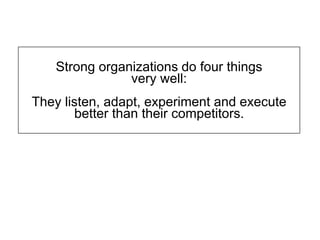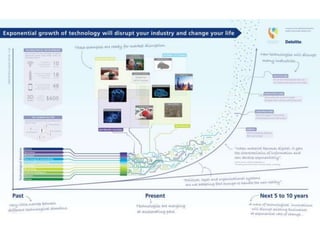Transform - or Die! - New York and Chicago
- 1. Follow my work on LinkedIn Get in touch: stefanlindegaard@me.com Join Transform – or Die! A movement for the people who own the future. Transform – or Die!
- 2. Author, speaker and strategic advisor on corporate transformation based on disruption, digitalization and innovation. Get in touch! www.transform-or-die.com stefanlindegaard@me.com @lindegaard Stefan Lindegaard
- 3. Strong organizations do four things very well: They listen, adapt, experiment and execute better than their competitors.
- 4. They should also focus on four key elements for corporate, organizational and societal transformation.
- 5. Why does transformation matter? Stay relevant, survive and prosper! This is also relevant for cities.
- 6. #1 The understanding of exponential growth based on merging technologies
- 8. #2 The impact of digitalization on your organization, industry and customers
- 10. What is IoT?
- 13. Credit: McKinsey
- 14. #3 The offensive and defensive nature of disruption
- 16. 1. Internal setup (right conditions, frameworks, remove obstacles) 2. Market approach 3. Offensive as well as defensive approach
- 17. #4 New approaches to innovation
- 18. Name five concepts, methodologies or approaches with big impact
- 19. Four key elements for corporate, organizational and societal transformation #4 New approaches to innovation #1 The understanding of exponential growth #2 The digitalization and how this impact your organization, industry and customers #3 The offensive and defensive nature of disruption
- 21. How Work with the outside world
- 22. What is open innovation / external collaboration? “…a philosophy or a mindset that they should embrace within their organization. This mindset should enable their organization to work with external input to the business processes just as naturally as it does with internal input” Open innovation as a term will disappear in 3-7 years!
- 23. Employees SuppliersManagers Academics / institutions Executives VCsAlumni Startups Business unit / function Users / consumers Government Competitors Inventors
- 24. InnoCentive Alliances / joint ventures Campaigns (Comm / Public) Entrepreneur Day Consortia MyStarbucks Idea.com Campaigns (Comm / Public) Supplier Summit CREDIT: OVO Innovation
- 25. How Focus on challenges as well as opportunities Use the best potential / least resistance perspective
- 26. How Go all in on digital
- 31. If you want to change the perception inside your organization, the outside voice is the most important.
- 32. What’s the matter with Owen?
- 33. Owen is just fine. But what is going on with your company?
- 36. 1. Traditional communication (intranets, websites, PR) 2. Stakeholder management and networking 3. Social media
- 37. How Change your organizational structures
- 39. Who Identify and develop the characteristics and traits needed for your company to win
- 40. 1) Holistic point of view (intrapreneurial skills) 2) Ability to constructively handle conflict 3) Optimism, passion and drive 4) Curiosity and belief in change 5) Tolerance for / ability to deal with uncertainty 6) Adaptive fast learner with sense of urgency 7) Talent for networking / strategic influencing 8) Communication skills
- 41. Who Know which people to train and how to do it
- 42. • The team itself • Employees • Managers • Executives • Key external stakeholders Who should be trained as corporate transformers and drivers of positive change? Guess what the most important group is – and also the most neglected one…?
- 43. Who Build people pools to match project pools
- 44. Discovery – Incubation – Acceleration: Have the right people for the right project at the right time in the right context. Build people pools, not just project pools.
- 45. Follow my work on LinkedIn Get in touch: stefanlindegaard@me.com Join Transform – or Die! A movement for the people who own the future. Transform – or Die!













































